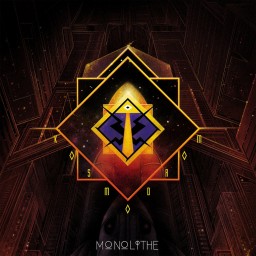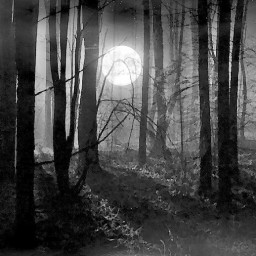Reviews list for Monolithe - Kosmodrom (2022)
Monolithe are not you typical death doom crew, it must be said. The Frenchmen have developed an increasingly progressive aspect to their death doom as their career has developed. They place great significance on song length - their first four albums were fifty-minute plus single track epics, 2015's Epsilon Aurigae and 2016's Zeta Reticuli both contained three tracks, each of exactly fifteen minutes duration, Nebula septem had seven, 7 minute exactly tracks and Okta Khora contained eight tracks of either 4:04, 8:08, 4:08 or 8:04 minutes duration. Kosmodrom continues this idiosyncratic tendency with, of it's five tracks, 1 and 4 are precisely ten minutes, 2 and 3 are 10:30 and the closer, Kosmonavt is exactly 26 minutes. Despite this significance that the band place on precision in track duration, I have never found it to be contrived or constrictive and their music never suffers as a consequence of forcing it into a strictly defined temporal space.
I think it is fair to claim that death doom is a pretty "earthy" style of metal. It often suggests abyssal subterranean chasms or huge, hulking mountain vistas. I know there are the lighter-feeling gothic exponents of death doom, but these still focus on quite primal emotions such as fear and loss. Monolithe however, look outwards and upwards for their inspiration and are one of the few producers of what I would call cosmic death doom. Previous album Okta Khora, for example, was a science fiction concept album about some highly advanced civilisation's unshakeable belief that they must force the universe back into it's original form by destroying everything in it. Not your usual death doom subject matter then? Kosmodrom takes as it's theme the early Soviet pioneers of space flight and the huge risks they faced and sacrifices they made to allow the human race to dream of attaining the stars - again, not exactly your typical death doom aesthetic.
This time around, though, Monolithe have leant more heavily on their earlier death doom style than was employed on their previous couple of releases, integrating the progressive elements within a death doom framework, rather than vice-versa. This may initially come off as something of a backward step, but the progressive elements are worked into the fabric of the tracks so intrinsically that the transition from full-on death doom to lighter, more progressive sections sometimes happens imperceptably, so there is, in reality, more going on within each track than may at first appear - Voskhod suddenly erupts in a clean, melodic riff with a throbbing, electronic feel, the twenty-six minute Kosmonavt takes includes a Cult of Luna-like building, post-metal section and during Kudryavka you suddenly realise you are listening to a Dave Gilmour-like Floydian section after it's hulking death doom beginnings and don't even remember how you got there!
If you are familiar with Monolithe's work to date then the opener, Sputnik-1, may seem to be a bit unexpected, it's heavenly female vocals (provided by Houston alt. pop artist London Lawhon) combined with Rémi Brochard's usual gruff growls, the huge, heaving, yet melodic, main riff and the overlaid keyboards may bring to mind My Dying Bride or the like and their gothic take on death doom and in truth I think it stands up to anything the Yorkshiremen have produced. However, rather than some corny gothic romance for subject matter, it's recalling of the aspirations of the people behind mankind's very first step into space exploration provides a theme I personally am more at home with.
As a whole package, Kosmodrom seems very complete and is so skillfully written and crafted that it throws a lot of recent death doom releases into the shade. Monolithe show that it is no longer enough to just keep knocking out slowed down death metal riffs and throw some deep growls on top to appease the death doom cognoscenti - there is so much more that the style is capable of and the Frenchmen, like those cosmic pioneers are forging onwards and upwards in order to expand the minds of the human race. Please don't misunderstand, Kosmodrom does not want for heaviness either. When it needs to be it is as heavy as you could possibly ever want, it just doesn't live or die solely on it's ability to shake the foundations. I would go as far as touting Monolithe as the death doom version of prime-era Opeth and that is heady praise indeed, so if you are in the market for intelligent, progressive extreme doom metal, then you really should give this a try.


 Sonny
Sonny